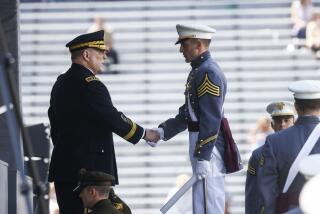Gates urges more money for a smarter Army
- Share via
WASHINGTON — Secretary of Defense Robert M. Gates said the Army needed more money, not just to make up for the losses suffered in Iraq but also for chronic underfunding since the end of the Cold War.
But Gates suggested that rather than using additional money to rebuild conventional war capability, the Army should ensure that it does not again forget the painful lessons it was forced to relearn in Iraq about fighting an insurgency.
Gates argued in a speech Wednesday that after the Vietnam War, the Army “relegated unconventional war to the margins” of its training and spending priorities. The decision seemed wise after the first Gulf War but has not looked as good in the years since, he said.
“It left the service unprepared to deal with the operations that followed: Somalia, Haiti, the Balkans, and more recently Afghanistan and Iraq -- the consequences and costs of which we are still struggling with today,” Gates said in his address to the annual meeting of the Assn. of the U.S. Army.
Gates said the Army should rebuild its “traditional edge” in fighting conventional wars. But he emphasized that low-intensity conflicts, like those in Iraq and Afghanistan, were far more likely to reoccur. America’s rivals have learned, Gates said, that the U.S. military can use its technology to crush standing armies but is vulnerable to “asymmetric” threats, like roadside bombs.
“We can expect that asymmetric warfare will remain the mainstay of the contemporary battlefield for some time,” Gates said.
From 1990 to 2003, the Army was underfunded by about $50 billion -- money that should have gone to new equipment, Gates said. He also suggested that it was a mistake to allocate only about 15% of the overall defense budget to the Army.
Because of extra funding for the Iraq war, the amount of money going to the Army has increased dramatically in the last five years. But Army officers are worried that the money could dry up as the U.S. begins to draw down its forces in Iraq.
Gates said the Army needed more to make up for past shortfalls, but warned the service to spend wisely.
“How those resources are used, and where those investments are made today, will shape the Army for decades to come,” he said. “We do not get the dollars or the opportunity to reset very often. So it’s vital that we get it right.”
Gates’ comments appeared to signal that he was willing to prioritize the needs of the Army, which has historically received a smaller share of defense budgets than the Navy or Air Force, whose fighter plane programs and aircraft carriers cost billions.
Gates appeared willing to spend billions to enlarge the Army and to commit resources to retain the best young soldiers. But the service may have to work to justify the relevance of new weapons systems that critics have said are better-suited to conventional battles than to low-intensity fights.
In his speech, Gates said the Army also must make sure it does not forget about the battlefield’s “human and cultural dimensions,” even as it develops newer and better technology. As an example, he said the best defenses against roadside bombs are not new technologies, but better ways to win over locals, so they can help soldiers find the bombs before they explode.
He also called on the Army to develop new capabilities, such as foreign-language skills, and suggested that the military would continue to be asked to take part in nation-building, an activity that soldiers once expected civilians to handle.
“Army soldiers can expect to be tasked with reviving public services, rebuilding infrastructure and promoting good governance,” Gates said. “All these so-called ‘nontraditional’ capabilities have moved into the mainstream of military thinking, planning and strategy, where they must stay.”
In the years to come, the Army will have to continue spending much of its efforts to train other nations’ militaries, as it is doing in Iraq and Afghanistan, Gates said. Some Army officers want the service to create a special advisor corps to focus on such training; others want all soldiers to be able to help with it.
Gates did not take sides in the debate but seemed to encourage the discussion to continue.
“How the Army should be organized and prepared for this advisory role remains an open question,” he said, “and will require innovative and forward thinking.”
--
More to Read
Get the L.A. Times Politics newsletter
Deeply reported insights into legislation, politics and policy from Sacramento, Washington and beyond. In your inbox twice per week.
You may occasionally receive promotional content from the Los Angeles Times.










